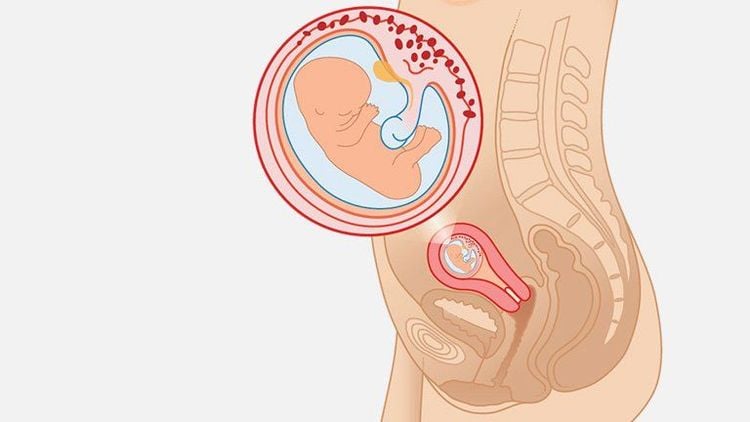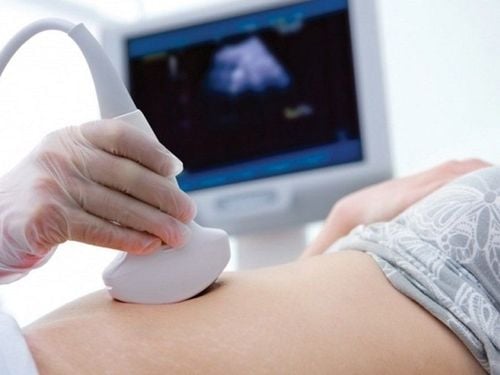This is an automatically translated article.
The article was professionally consulted by Specialist Doctor II Tran Thi Mai Huong - Department of Obstetrics and Gynecology - Vinmec Hai Phong International General Hospital.Entering the 25th week of pregnancy, pregnant women are approaching the end of the second trimester of pregnancy. Your baby is growing steadily, Not ready yet, but it won't be long before your baby is officially born.
1. The development of the fetus at 25 weeks old
The twenty-fifth week of pregnancy brings a lot of changes for both mother and baby. You may experience uncomfortable but normal symptoms of this stage of pregnancy, such as Restless Leg Syndrome (RLS), heartburn, Carpal Tunnel Syndrome...At week During the twenty-fifth week of pregnancy, your baby is starting to accumulate fat, which makes his skin smoother and makes him look chubby. For some babies with early hair growth, at this week of pregnancy, the color and quality of the baby's hair begins to appear. Your baby's reflexes are also developing.
The 25-week-old fetus also loves to dance and play in the womb, the fetus can also hear the mother's voice and other sounds. The fetus has its own fingerprints, the crease marks in the palm are gradually appearing.
Baby will look rosy thanks to the formation of small blood vessels called capillaries on the skin, these capillaries help increase blood flow under the skin. Even though your baby's eyelids are still closed, visual receptors - cones and rods - have formed and sense light or dark.

2. The size of the fetus at week 25
At the twenty-fifth week of pregnancy, the fetus will weigh about 756 grams, about 33.7 cm long, about the size of an ear of corn. Along with other changes in the body, this weight gain is a preparation for life outside the womb.Details of fetal development week by week, every parent should learn:
3. The position of the twenty-fifth week fetus
At this time, the fetus has not yet decided which position to change to prepare for birth. The baby's head is still close to the mother's chest and the feet are pointing down. But your baby will change positions soon, sometimes as early as next week.During the twenty-fifth week of pregnancy, the fetal nose and nostrils begin to work, the fetus begins to inhale amniotic fluid. The capillaries that form on the skin are now also forming in the lungs, so that the fetus can learn to breathe right now. The lungs begin to produce surfactant, which helps the baby breathe after birth. However, the fetal lungs are still immature and cannot oxygenate the blood. The fetus also begins to develop a sense of balance, such as distinguishing which way is to swim up and which is to swim down right in the mother's womb, the baby's hand skills have improved and can make movements. grip action.
4. Mother's body in the twenty-fifth week of pregnancy
During this week, you will notice weight gain and may experience some new symptoms. Some pregnancy symptoms make you tired, but mom, it's a sign that your body is trying to make the baby grow healthy!Your uterus is now the size of a soccer ball. Usually, a mother will gain about 7-8 kg during pregnancy and 11-18 kg if she has twins. Many mothers begin to gain weight due to water retention during this period, so as long as the mother is gaining weight at a reasonable rate, these fluctuations are normal.
You will also notice that your baby is moving harder with more movements, so prepare yourself for kicks, acrobatics and kicks in the womb. Your baby also begins to respond to music, voices, and sounds.
Many women begin to feel more tired at the end of the second trimester of pregnancy, the mother's belly is also larger, making the mother feel bloated, with some symptoms such as:
Restless legs syndrome: This syndrome makes the mother feel that she has to constantly move her legs to reduce the stinging or crawling sensation, often appearing in the arms, thighs or hands when the mother is resting or sleeping. The main cause of this syndrome is unknown, but the main mechanism that facilitates Restless Legs Syndrome may be hormonal changes, as well as iron and folate deficiencies. But don't worry, this symptom will go away on its own about four weeks after giving birth. You can do light exercise, take a warm bath before bed, take supplements containing Iron, folate, vitamin B12, Magnesium and avoid coffee, but always consult your doctor before taking any medication. come on mom! Thicker hair: Hormonal changes during pregnancy inhibit normal hair loss. Carpal Tunnel Syndrome: Fluctuations in hormone levels, fluid retention that tends to cause edema, nerve hypersensitivity, and fluctuations in blood sugar can cause symptoms of carpal tunnel syndrome such as: momentary numbness or stinging sensation. These symptoms are usually mild and are of no concern, and do not require treatment in most cases. Hemorrhoids: The increased abdominal circumference puts pressure on the pelvic veins, which can cause hemorrhoids. Hemorrhoids are uncomfortable, but common during pregnancy and usually go away on their own after giving birth, except in some cases requiring interventional treatment as prescribed by a doctor. Heartburn and indigestion: The fetus also puts increased pressure on the mother's digestive system, such as pushing stomach acid up the esophagus Bloating: During pregnancy, hormonal changes slow the mother's digestion process. In turn, causing gas to accumulate causing bloating and constipation.

5. Ultrasound at 25th week of pregnancy
Usually, you will not have an ultrasound during this week of pregnancy, unless you need close follow-up tests prescribed by a specialist. From the twenty-fourth to the twenty-eighth week, you will have a glucose tolerance test to rule out the risk of gestational diabetes. If you have had this test before and have an abnormal result, your doctor will order the test again this week.6. What to do in the 25th week of pregnancy?
Continue a healthy diet: Continue a high-fiber diet, eating plenty of vegetables and fruits, nuts, and low-mercury fish and lean meats. You don't have to eat for two, just don't skip meals. Light exercise: Avoid contact sports, excessive heavy lifting, and lying on your back. But besides that, you need to exercise regularly, listen to your body (and your doctor's advice!), do not exercise when you feel too tired, short of breath or dizzy. Drink plenty of water: Make sure your body is well-hydrated to avoid constipation, bloating, and hemorrhoids! Moisturize: You may experience stretch marks on your abdomen and breasts around the twenty-fifth week of pregnancy, and you may even develop an itchy rash. Daily moisturizing can help you avoid these problems. Planning for birth: No one can say for sure what will happen at birth, but this is a reasonable time for moms to think about the method of birth she wants. Prepare your baby: You can start shopping for baby essentials before your belly gets bigger and you feel more uncomfortable. Newborn preparation: Especially if this is your first time as a mother, this is the time when you should prepare knowledge about your baby, how to care and what can happen. Manage stress: The time of labor is not far away, it's understandable if you feel anxious, but studies show that mothers who have a negative mindset during pregnancy are at increased risk of postpartum depression higher, so the twenty-fifth week of pregnancy is a good time to learn how to manage stress.7. Abnormal signs in the 25th week of pregnancy
Tell your doctor as soon as you experience uterine contractions, bleeding, or any other symptoms. You can discuss with your specialist your symptoms, methods of preventing and controlling them, and your birth plan.25 weeks pregnant is in the middle 3 months of pregnancy, at this time pregnant women need to pay attention:
Comprehensive fetal malformation screening by superior 4D ultrasound technique. Screening for gestational diabetes, avoiding many dangerous complications for both mother and baby. Control the mother's weight reasonably to assess the health status of the pregnant woman and the development of the fetus. Understand the signs of threatened early delivery (especially in those carrying multiple pregnancies or having a history of miscarriage or premature birth) so that they can receive timely treatment to maintain pregnancy. To protect mother and baby during pregnancy, Vinmec provides a comprehensive Maternity service to monitor the health status of mother and baby, periodical antenatal check-ups with leading Obstetricians and Gynecologists. enough tests, important screening for pregnant women, counseling and timely intervention when detecting abnormalities in the health of mother and baby.
Please dial HOTLINE for more information or register for an appointment HERE. Download MyVinmec app to make appointments faster and to manage your bookings easily.
Articles refer to sources: Mayoclinic.org, Webmd.com, Babycenter.com, Whattoexpect.com













